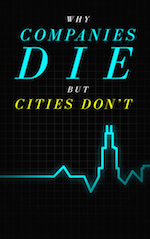The news is that Alphabet/Sidewalk Labs is looking to build a city from the ground up. My first reaction when I heard this was 'Sign me up!'
And then I started to read more speculations and the proposition became less desirable with every word. Why you ask? Well, I'll share the things that Sidewalk Labs can do to avoid making the mistake of building a city the way one builds a company and consequently dooming the city before it even starts.
It shouldn't be a surprise to most, considering how ambitious Alphabet is, that the idea of building a city would be one under consideration. I wrote about the ambition to own our energy and cities a few months ago. Larry Page (and Sergey Brin) is a student of company evolution and the organic nature of cities. But all the articles are stating that the project, codenamed Sidewalk, will be used as a testbed for self driving cars, high speed internet, smart connected devices and maybe even some of the scary robots that Alphabet has in its portfolio. Reports claim that 100s of city planners and technologists have been hired to design and build this techutopia. All this under Sidewalk labs, the Google project that became a company focused on 'working with cities to build products addressing big urban problems'. So what is the problem with this approach to building a city from the ground up? Three systems issues
- A city is not just a collection of things: I can safely say that you have never had a conversation about the city you grew up in that ended with the statement 'I miss the buildings that we lived growing up'? That's not how or what we think about when we think about cities. It's not the things/buildings. A city is a combination of all the elements (buildings, streets and infrastructure), interconnections (relationships with your hairstylist/barber, local deli and the parks) and the purpose (why did people settle along the banks of the river?) of that city. To throw technology and things to build a city is to ignore the purpose. To think technology is the solution is to miss the purpose.
- The areas of highest leverage are often the least obvious: From all indications, the reason for building this city, according to The Information, is that 'building cities from the Internet up is compelling' and 'the technology ultimately cannot be stopped'. Statements like this say nothing about the real issues that we have in our cities and are all about technology for its sake. Since we are being ambitious, building cities from the bottom-up, why don't we go all the way and solve the real issues we have with our cities? Why don't we address the lack of empathy in our cities and society? Since we are taking moonshots, that might be something to embed into this utopian city we are building. Technology fixes are obvious and simple (for the most part) but that's not where the most impact can be made in moving us into the future.
- A city is not a problem to solve: This approach to building a city, using technology to solve it as a problem, stems from the same approach that helped companies like Alphabet succeed; to build a great technology company is to find a large enough problem(s) and apply creative or advanced technology to solve said problem. A city, in fact every city, has problems. But a city is not a problem. A city is an organic entity that scales according to the needs of the dwellers, increase in resiliency regardless of the setbacks it faces and evolves enough to be recognizable as the city it once was but continues to grow into the city the next set of dwellers fashion it into.
The Information reports that Denver and Detroit are being considered as test beds. If that is the case then this city will not be built from the ground up (phew!). It will just be the next stage in the evolution of a city, the one selected, that currently exists. Cities are truly just physical expressions of who we are and the things that matter to us as human beings. We still have a ways to go before technology fully replicates that...

